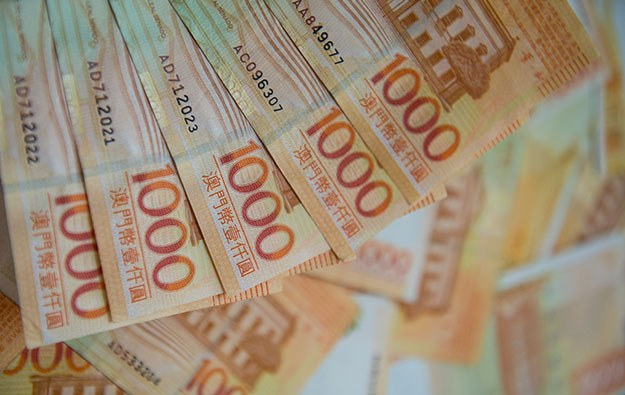Macau govt says no request by casino ops for tax breaks
Feb 25, 2020 Newsdesk Coronavirus Crisis, Latest News, Macau, Top of the deck

Macau’s casino regulator “has not received any applications” from the city’s casino operators for gaming tax breaks amid the current coronavirus alert, the body told GGRAsia in response to our enquiry. The Gaming Inspection and Coordination Bureau, also known as DICJ, said so in an email.
The office of Macau’s Secretary for Economy and Finance – representing the official who has direct oversight of the city’s casino industry – likewise told us it had not received any such request.
Last week, Ambrose So Shu Fai, vice-chairman and chief executive of Macau casino operator SJM Holdings Ltd, told a Hong Kong media outlet that his firm thought the idea of a reduction in premiums payable to the Macau government on casino tables and gaming machines – and perhaps certain rebates on undefined “gaming-related” taxation” – might be viewed sympathetically by the local authorities because of the business uncertainty caused by Covid-19.
In Macau, “gaming tax” is usually a reference to taxation on gross gaming revenue (GGR). This is currently levied at 35 percent, although other charges – for certain community causes locally – take the effective tax rate on GGR up to 39 percent.
In early February the Macau government had ordered a 15-day closure of the city’s casino floors as part of efforts to contain locally the spread of novel coronavirus. A total of 29 out of the city’s 39 active casinos reopened in a phased fashion from February 20, but with fewer than 30 percent of the market’s available tables back in commission, the regulator had said. Meanwhile, four other gaming venues resumed operations on Monday, the DICJ confirmed in an emailed statement to GGRAsia.
Hours before the casino closures, Macau’s Chief Executive, Ho Iat Seng, had told the media that his administration anticipated a fiscal deficit for the local government this year amid the coronavirus disruption, although he added the city had “sufficient fiscal reserves” to support the local economy.
On February 13, the local government had announced a package of measures that included help for certain non-gaming businesses in dealing with the commercial fallout from coronavirus. It included a six-month ‘tax holiday’ on 5-percent tourism tax normally payable on certain services provided by hotels, bars, gym rooms and karaoke venues. The measure would cover 854 such establishments.
During January this year, the Macau government had collected nearly MOP8.84 billion (US$1.1 billion) in tax revenue from the city’s gaming industry, according to latest data available from the Financial Services Bureau. The tally was 13.3 percent down compared to the same month last year.
The January tax take on GGR accounted for 88.9 percent of the Macau government’s total current revenue of nearly MOP9.94 billion as of January, showed that bureau’s data.
Macau’s casino GGR for January stood at MOP22.13 billion, down by 11.3 percent year-on-year, according to the gaming regulator’s data. That month included the Chinese New Year holiday. On January 22, shortly before this year’s festival period, Macau confirmed its first imported case of coronavirus infection. Cases of infection treated within Macau peaked at 10 in early February and the tally has not risen since, according to local government information.
Related articles
-
 Macau regulator probes unlicensed...
Macau regulator probes unlicensed...Jul 24, 2024
-
 Macau govt to keep cap on junket...
Macau govt to keep cap on junket...Jul 10, 2024
More news
-
 Donaco EBITDA up y-o-y to above US$4mln...
Donaco EBITDA up y-o-y to above US$4mln...Jul 26, 2024
-
 HK listed Palasino upgrades Czech...
HK listed Palasino upgrades Czech...Jul 26, 2024
Latest News
Jul 26, 2024
Border-casino operator Donaco International Ltd has achieved a 164.17-percent year-on-year increase in its latest quarterly group earnings before interest, taxation, depreciation and amortisation...Sign up to our FREE Newsletter
 (Click here for more)
(Click here for more)
Pick of the Day
”We’ve got more traction outside of Macau at the moment. But Macau’s going be a bigger focus for us”
David Punter
Regional representative at Konami Australia
Most Popular
 Sheraton brand to exit Londoner Macao, to be Londoner Grand July 25, 2024
Sheraton brand to exit Londoner Macao, to be Londoner Grand July 25, 2024  Macau regulator probes unlicensed gaming agents July 24, 2024
Macau regulator probes unlicensed gaming agents July 24, 2024  Philippines gives 20k aliens in POGOs 60 days to leave July 25, 2024
Philippines gives 20k aliens in POGOs 60 days to leave July 25, 2024  Philippines-listed DigiPlus says not affected by POGO ban July 24, 2024
Philippines-listed DigiPlus says not affected by POGO ban July 24, 2024  Sands China 2Q EBITDA down q-o-q amid low hold, renovation July 25, 2024
Sands China 2Q EBITDA down q-o-q amid low hold, renovation July 25, 2024






